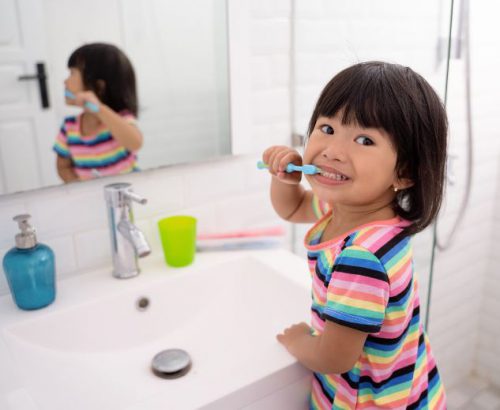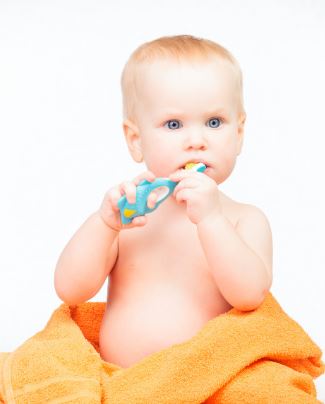February is the perfect time
for kids and parents to learn about oral health. Why? …………..
Because February is National Children’s Dental Health Month!

One significant oral health risk for infants and young children under the age of 1 is from baby bottle tooth decay. This occurs when your child consumes sugary liquid, then bacteria in their mouth consume the sugar and produce acid. This acid attacks the enamel on baby teeth, and can trigger tooth decay after continued exposure. Liquids that contribute to this condition include milk, formula, fruit juice, carbonated drinks, and any other sweetened drinks. If your child needs to sleep with a bottle, water is the safest option without any risk.
A poor diet and inadequate tooth brushing during the first two years of a child’s life can increase their risk of cavities. Cavities can even begin in a baby’s first tooth! Tooth decay in baby teeth can also increase the risk of cavities in permanent teeth.
Early detection and treatment of tooth decay and other oral health problems is essential for healthy teeth. Going to the dentist for dental health exams and hygiene from a young age also helps children feel more comfortable and less stressed out about visiting the dentist.
- Begin flossing. Once your child’s teeth touch, you can start flossing in between them.
- Snack healthy! Fruit juice, sports drinks, fruit snacks, and sticky sweets all pose serious threats to your child’s teeth. Give kids calcium-rich snacks like cheese or low-sugar yogurt. If you have to resort to a sweet snack – a chocolate bar is preferable to gummy or sticky sweets that can get lodged in between the teeth, even after brushing.
- Keep them hydrated! Avoid sugary drinks and stick to good old-fashioned water. Water helps to rinse away any sugar or particles that can lead to cavities.
- Replace your child’s toothbrush every three to four months.
- Clean your baby’s gums daily. Until the first tooth appears, gently wipe a damp cloth over the gums to clear away harmful bacteria after each feeding.
- Start brushing the first tooth. Begin brushing your baby’s teeth when you see one coming in with a soft infant toothbrush.
- Brush twice each day for two minutes. Always supervise kids younger than six years old while brushing.
- Schedule routine check-ups. If it’s been more than six months since your child has seen a dentist, schedule an appointment as soon as possible.



